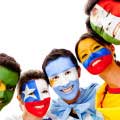
As a young girl, every time an American said to me “where is your accent from?” I felt insulted. Whenever a Spaniard called me guiri (a slang word for “foreigner” that comes from guirigay, which means “hubbub or chaos,” referring to how a foreign language sounds to a non-speaker) or yanki, I felt honored, even if it was meant as an insult.
I attended a British school in Spain, where I was surrounded by all-Americans, all-British, all-Spaniards, all-Colombians, all-Mexicans, all-Somethings—or so I thought—while I was all-Nothing. I didn’t want to have an accent, I didn’t want to be bicultural or bilingual. I just wanted to be one thing! My Spanish was (and still is) so native-sounding, that my Spanish friends didn’t believe I could really be American, and I resented it.
My Spanish abuelita once sent me to school with a packed lunch of bocadillo de mejillones (a mussels hoagie is the closest translation), which I later threw in the trash out of embarrassment. I envied the PB&Js my American friends carried in their trendy lunchboxes, along with shiny red apples that simply didn’t look so perfect in my Spanish world at home.
BILINGUAL IN AMERICA
I wanted so badly to be American, because it seemed, on all accounts, the best thing to be. I held an American passport and citizenship since birth. My mother and her family were American, from Pennsylvania. But alas, I was born in Madrid, Spain, while my dad, a Spaniard, was earning his doctorate there. My mother traveled with him because they wanted to have a child born in Spain. For me, it was a curse of sorts during my whole childhood. I even envied my younger sister because her city of birth was Scranton, Pennsylvania.
Despite my resistance to being bicultural, I grew up bilingual. I read, write, and speak both languages equally. Furthermore, I can adjust to British or American spelling and tweak the Spanish to that of different countries.
This has given me a professional and personal advantage. I made a very good living as a language interpreter and translator for a long time, and the fact that I command two languages and understand, live, and breathe two or more cultures is an asset that no college degree can provide. As an adult, I learned that my American grandmother was in fact of British ancestry and that my grandfather had Hungarian roots. I also realized that for the most part, my accent wasn’t questioned to insult me, but because it sounded exotic.
Read Related: 10 Spanish Phrases for Success
When I became a mami, I made sure my kids had both nationalities, as I do, and also that their first name could be easily pronounced in English and Spanish, unlike my own. I moved to Florida in 2004, from Spain, and since then my accent has mellowed. Spanish speakers and English speakers alike wonder where I’m from, since my Spanish has picked up the richness and cadence of different Latin countries, and my English is still too proper to be all-American. I felt—and still do—most comfortable in the company of mixed people like myself and like my significant other—who was born in the Dominican Republic and raised in Mexico, of Haitian and New Zealander parents. At home we speak in English or Spanish and I read and write in both. I cook paella, tortilla de papas, and tapas and he cooks tacos al pastor.
A CULTURAL MIX
My kids and his revel in the mix that is so familiar and natural to them and they are proud of their roots. My girls also have Argentinean and Swedish blood, to add to what I brought into the mix.
FINDING MY VOICE
Of course now there is more diversity in the world than when I grew up, and also I am very aware of the perils of losing sight of your cultural identity as a child, so I foster their pride in such a diverse background. They travel to Spain once a year, to visit family and friends, and they attend Spanish classes where they engage with other Latino families.
When asked where I’m from, I usually just say I was born in Spain and grew up bilingual and leave it at that. But that is not the whole truth. The truth is that I have a hot-blooded Latin temperament paired with a practical go-getting American mindset, I am a little bit Hungarian, a little bit British, a large part American, a lot Spanish, and all Latina at heart. I say this because, until I found my niche as a writer in the U.S., I wasn’t heard.
The moment I was identified as a Latina writer, I found my voice, and I embrace that. I am proud to be a part of a community that is colorful, rich, diverse, and exotic in culture, language, mindset, and customs. I’ll dance a salsa, merengue or bachata to that.
Lorraine C. Ladish is the Editor-in-Chief of Mamiverse. You may follow her @lorrainecladish and @mamiverse
[Mamiverse’s Bilingual Plus is an online channel devoted to bringing parents and educators the bilingual learning tools they need in the form of digital picture books, sing-alongs, and free curriculum-based family activities.]












